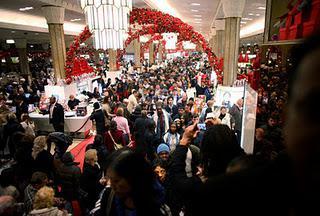
Tis the -- shopping -- season
We’re in early December and for Americans that means we’re smack in themiddle of the holiday season. It also means we’re in the full register-ka-ching-ingfocus of the shopping season. Indeed if you were to list the most obviousmanifestations of approaching Christmas [1] you would probably include the tiny many-coloredglowing lights adorning neighborhood houses, or the Christmas trees and other seasonallyrelated decorations inside the homes of you, your family, and friends [2], butalso the inescapable, omnipresent, overwhelming seasonal advertising.From the radio spots you suffer through when driving to work in themorning, the bright, glossy ads in newspapers and magazines, the loudtelevision commercials, annoying internet popups, and in-your-face billboards…it’severywhere. It’s Christmastime, and it’s time to shop. Best Buy, Walmart, and Targethave, as usual, put out their heavy dosage of ads, but allmajor retailers are in on the game. I’m especially confounded by thoseridiculous "December to Remember" Lexus commercials aimed at whatever infinitesimal fraction of thepopulation chooses to buy luxury cars for Christmas [3]. And I guess it’s working, giventhe record sales on the super-hyped Black Friday and Cyber Monday shoppingdays. And surely many people, like my mom and aunts, really enjoy shopping; zeroingin on sales, mingling with the crowds, and wrapping gifts [4]. Why else would hordes of peoplestay up through the night of Thanksgiving jostling with other midnight shoppers? Itcan’t be just for the money-saving sales.
This year I’ve been struck by the tone of the advertisements, almost asif it’s your duty to shop, something along the lines of voting or obeyingtraffic laws. If you don’t participate, then it’s somehow antisocial andun-American. If you’re like me, you probably find this commercialization ofChristmas unsettling in a somewhat-hard-to-define way. I’m not religious, but Iwas raised Catholic and went to Catholic school, and so, of course, it’s stillworth noting that Christmas is a religious holiday, deeply special toChristians because it marks the birth of Jesus. In its evolved modern context, theholiday has wider significance than its religious foundations. It’s a time ofcelebration of the year completed, a time to spend with family a friends, andyes, even a time of giving. It’s this aspect of Christmas, the time spent with family and friends, that makes the Christmas season meaningfulto me, and I’m guessing (or hoping), it is the largest reason Christmas is “the mostwonderful time of the year” for most of you as well.
A part of what unsettles me about the commercial side of Christmas isthe often cited fact that the holiday retail season is an essential feature ofthe consumer-driven American economy. You’ve probably heard the misleading statistic that two-thirds of the U.S. gross domestic product is derived fromconsumption – people buying things, but regardless of the real value, shoppingis a major part of the modern economy. And about 20% of all retail sales comeduring the Christmas shopping season (November to December). This explains whybusinesses are so forceful with Christmas ads – they must make their moneybefore the end of the year, or risk red-ink and failure. (I may be off base, butit seems a little alarming that a major prop of the world’s largest economy is thebuying of Christmas gifts.) That’s also why we’re subjected annually to thephenomenon that Gregg Easterbrook has termed “Christmas Creep”: Seasonaladvertisements appearing ever earlier in the year. Now it’s common to comeacross Christmas-themed store displays and print advertisements beforeHalloween, sometimes well before. How long before Christmas advertisementsstart in the summer? It sucks a lot of the specialness out of the season whenChristmas is exploited throughout the non-Christmas-time of the year.

Gifts under the Christmas tree
But that’s an external issue. What really bothers me the most is the expectations thatcome along with gift-giving. I’m an embodiment of the cliché that it is betterto give than receive. When I was a child I loved to get gifts, and I wasfortunate that my parents and other relatives lavished me and my brother andsister with a lot of them. But now with maturity, I much prefer giving gifts tomy family (girlfriend included), especially when I know they can use or want what I’vegotten for them. It’s a rewarding feeling and genuinelyselfless, I give for the enjoyment of others and not for my own satisfaction ofgiving (although I guess I can’t deny the presence of some selfish gratificationI get from being perceived as generous and thoughtful). But unfortunately, too oftengift giving is not a bonus of Christmas but a requirement, a burden.You haveto get gifts for your boss, or for a friends’ gift exchange, or for a distantrelative, or because a coworker got you a gift. And so you have to go out tothe mall, and fight traffic, and find an open space in a massive parking lot,and push through huge crowds at the stores, and talk with rude overworkedsalespeople, and wait in long lines listening to that terrible mall loudspeakermusic, and all-in-all spend your valuable time and money getting gifts that youdon’t even care to give just so you can feel you’ve done your part to earn agift that you probably won’t like from someone you didn’t want to get a giftfrom in the first place. And this is a part of Christmas, and for all thereasons listed above, it’s likely to stay a part of Christmas.
And it’s this internal conflict, this insidious product of consumerism, which getsunder my skin. I can ignore the ads, I can wait until December to put up mydecorations, and I can buy all of my gifts (or almost all) on-line. But what Ican’t brush off is the disappointment, resentment, and general bad feelings that come when you fail to get someone agift, or when they don’t give one to you. When the behind-the-back complaints are aired about what a thoughtless, cheap, inappropriate, miserable gift so-and-so got for the complainer. You've certainly heard these types of gripes, you may even be guilty of some yourself. And they suck. A gift by obligation is no gift at all.Gift giving should be a pleasure not a burden. That’s the real spirit of theseason. Ask yourself what gift your brother or mother, cousin or friend got foryou in say, 2002? Can you even remember? I can’t, but I remember the time spentwith them, the season shared. And that’s all I hope for and want fromChristmas. We’re in the shopping season, but that won't be what Christmas is all about. This might come across as an well-worn platitude, and that's okay. The thoughts might be widespread (I hope they are), but they're worth repeating.
---
NOTES:
[1]I always spell out “Christmas,” never using the abbreviation “X-mas.” This isfor aesthetic reasons mostly, I like to avoid abbreviations where possible. Whyuse an abbreviation when spelling out the word is an option? Not only does anabbreviation reek of laziness, it also somehow takes the magic away from theword (and in this case, if you’re a religious person, the real meaning of the day).
[2] I can't help but recall comedian Jim Gaffigan's bit about the oddity of hanging lights outside and decorating a tree inside…here's the skit.

The somewhat odd, but very appealing tradition of decorating for Christmas
[3]The buyers are always beautiful, mostly young – even when they are parents – andlive in immaculate luxury. Like the flawless families of fancy magazine spreadscome to life. Really, people buy super-expensive cars based on theseadvertisements? I'd link to one of the commercials, but I don't want to even tangentially participate in these ads.[4]Really, some of the wrapping on my family’s Christmas gifts is too elaborateand ornate to be anything other than a product of love.

